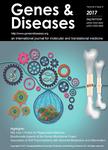The estrogen metabolite 2-methoxyestradiol regulates eukaryotic initiation factor 4E(eIF4E)and inhibits protein synthesis in MG63 osteosarcoma cells
作者机构:Department of OrthopedicsMayo ClinicRochesterMN 55905USA
出 版 物:《Genes & Diseases》 (基因与疾病(英文))
年 卷 期:2016年第3卷第2期
页 面:153-158页
学科分类:0710[理学-生物学] 0831[工学-生物医学工程(可授工学、理学、医学学位)] 1002[医学-临床医学] 1001[医学-基础医学(可授医学、理学学位)] 100214[医学-肿瘤学] 0703[理学-化学] 10[医学]
基 金:Riviera Foundation Mayo Clinic
主 题:2-Methoxyestradiol 4E-BP Estrogen metabolite eIF4E Osteosarcoma
摘 要:Osteosarcoma is a primary bone tumor that affects children and young adults.The estrogen metabolite 2-methoxyestradiol(2-ME)induces cell death in osteosarcoma cells.To determine whether 2-ME actions involve the control of protein synthesis,we studied the effect of 2-ME on eukaryotic initiation factor 4E(eIF4E)and eIF4E-binding protein 1(4E-BP1)in MG63 osteosarcoma cells.Our results show that 2-ME treatment increases the association of eIF4E with 4E-BP1 in osteosarcoma cells.Also,2-ME decreases the binding of eIF4E protein to 7-methyl-guanosine cap structure,indicating that 2-ME treatment results in the inhibition of translational initiation.These findings are further supported by the inhibition of protein synthesis in 2-ME-treated osteosarcoma cells.Taken together,our studies show that 2-ME-mediated antitumor effects in osteosarcoma cells involve the regulation of protein synthesis,and translational machinery could serve as a target in the treatment of osteosarcoma.



